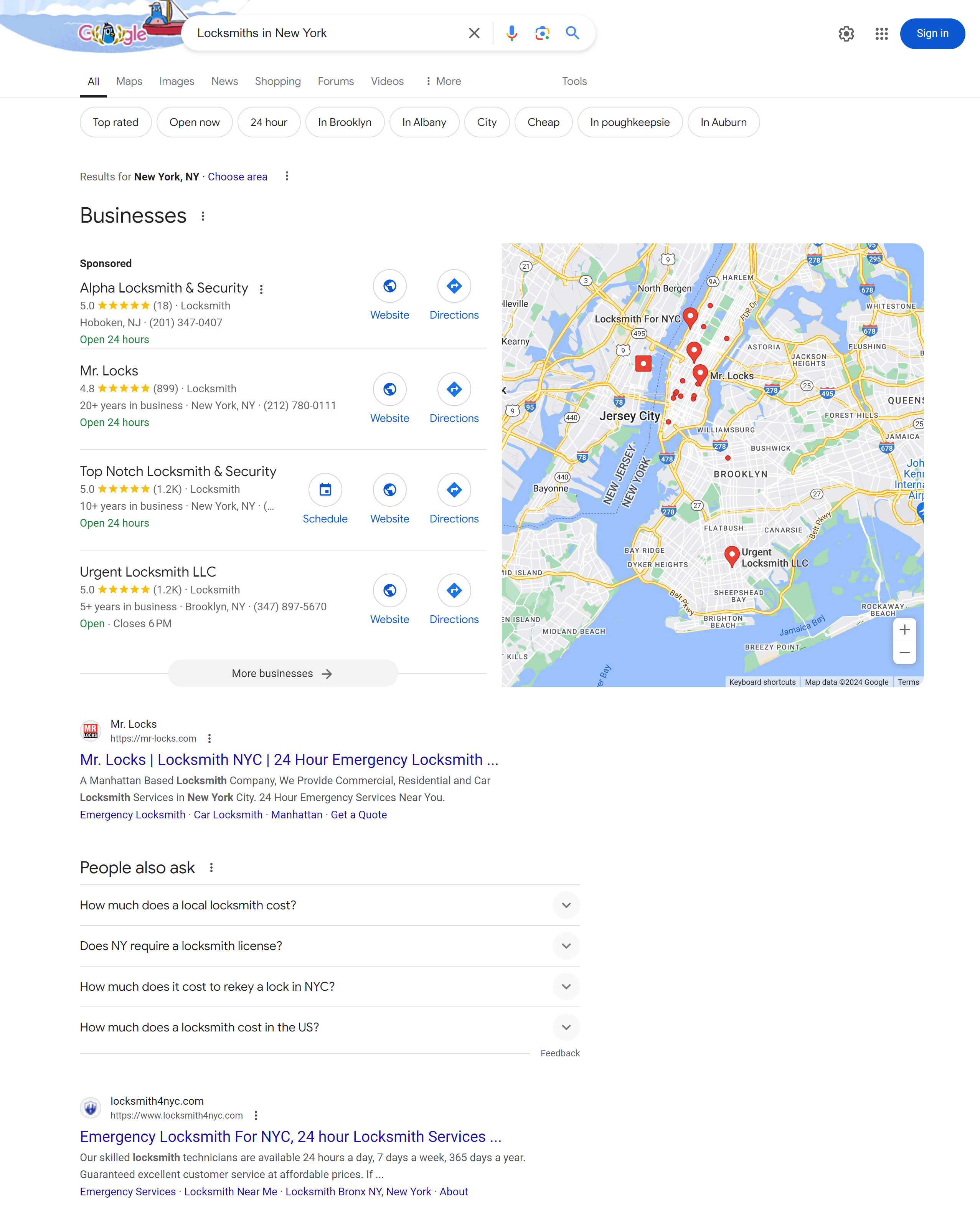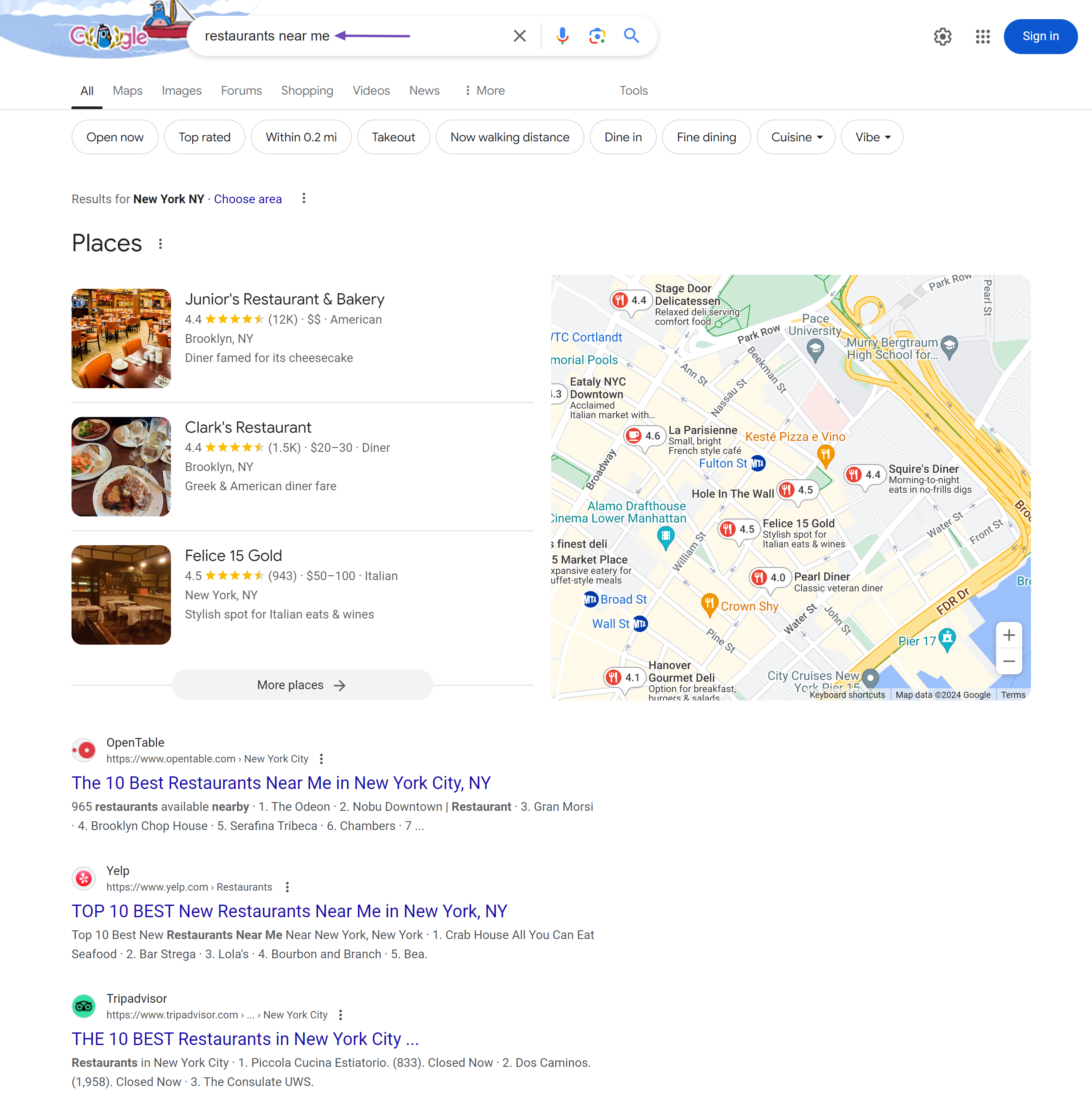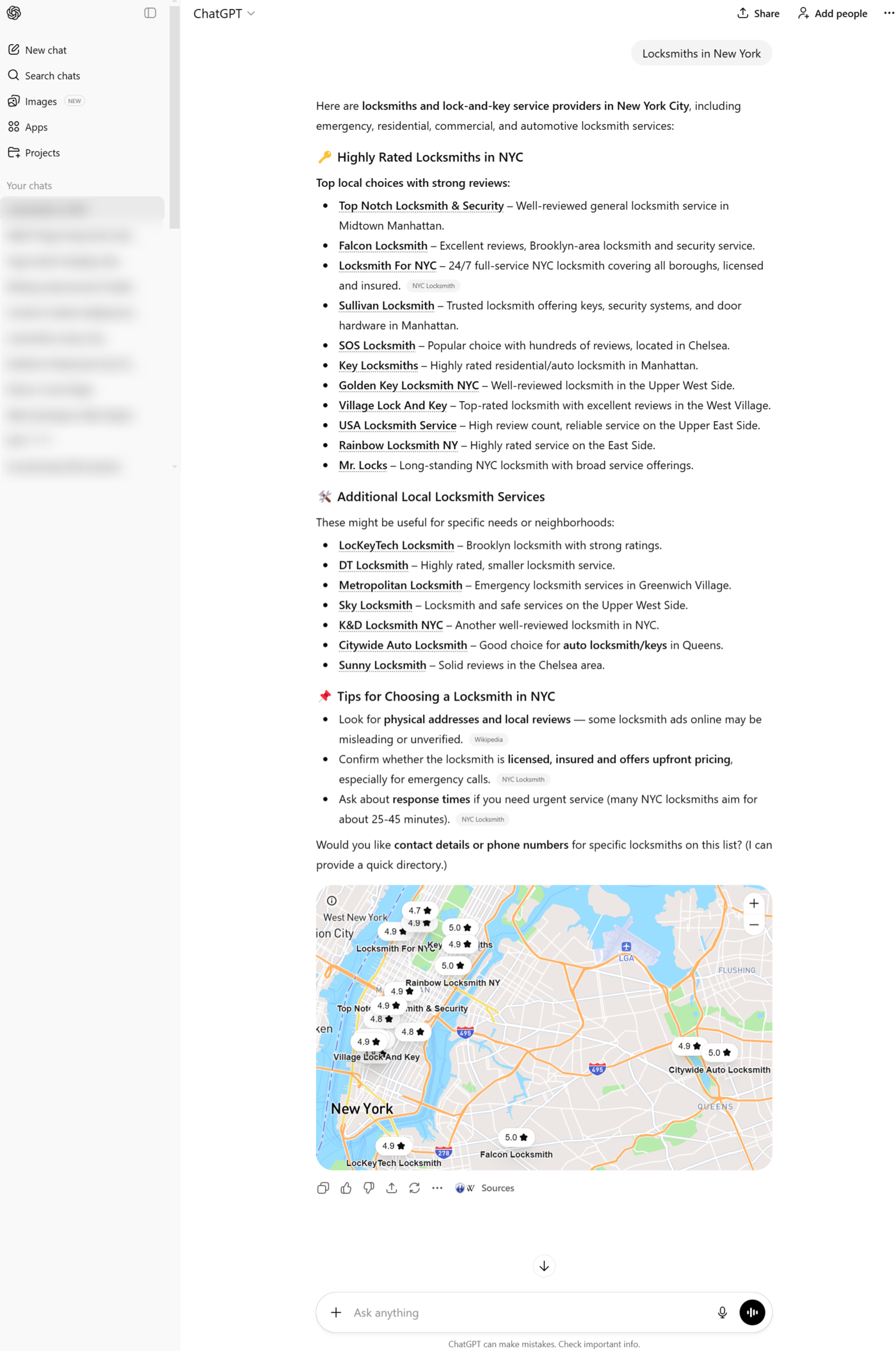Was ist Local SEO?
Local SEO, or local search engine optimization, is a specialized form of SEO that focuses on optimizing a business’s online presence and increasing its visibility on local search result pages.
Local SEO is only relevant to businesses that offer products or services to customers within a location. It is intended to optimize these businesses and make them appear in response to search queries from users seeking their products or services.
What Are Local Search Queries?
Local search queries are words and phrases that people use to find local businesses that offer products or services they need. You can think of them like regular search queries, except that they are used to find products or services within an area.
Zum Beispiel, Locksmiths in New York is a local search query. It indicates the searcher wants the services of a locksmith that is based in New York.
In return, Google will return a webpage containing the details of locksmiths in New York. At the top of the results page is the local pack that contains three or more businesses along with the map pack.

Similarly, local results will appear when the searcher includes words like “near me” or “around me” in their query.

Local results do not only appear on search engines. Even generative KI chatbots with browsing capability can return local businesses in their responses. For example, this one is from ChatGPT.

Importance of Local SEO
Local SEO allows search engines and AI chatbots to connect businesses with potential customers. Local search queries indicate that the searcher wants to visit a business.
So, a local business listing provides visitors with the contact information and location of the business. This benefits business owners, allowing them to display their businesses to potential customers for free.
How Google Determines Local Search Rankings
Google uses several signals to determine what businesses to show to a searcher. Specifically, Google uses three signals, namely:
- Distanz
- Relevanz
- Bedeutung
1 Distanz
Google prefers connecting searchers with businesses close to them. So, the exact business shown to the searcher will vary depending on the searcher’s current location.
Businesses have no control over this signal. Google determines the distance using the location the visitor included in their search. If the user does not specify a location, Google will calculate the distance based on whatever information it knows about the searcher’s location.
2 Relevanz
Google only wants to return results that are helpful to the searcher. So, it returns results that best match the searcher’s intent.
Google determines relevance by analyzing how well your Google Business Profile matches the query the visitor searched for. The more they match, the more relevant your business is considered, and the higher your chances of appearing in response to their query.
3 Bedeutung
Google is likely to show more popular businesses in response to local searches. For example, a popular hotel or store is likely to get more visibility on local results pages than one that is not well-known.
Google determines prominence using information it gathers from across the web. A business’s position in search results pages, positive review count, and review score will also increase its chances of getting more prominence.
Together, Google uses distance, relevance, and prominence to determine what local results to show to the user. For example, while Google typically prefers displaying locations closer to the searcher, it can show much farther results that are more relevant and prominent to the searcher.
List of Google Local Search Ranking Factors
Google uses several metrics, signals, and algorithms to determine where a business appears on search results pages. This list is not conclusive, as Google typically does not confirm its ranking factors. However, if you want to rank on Google local results pages, you should ensure that these signals and metrics are in order.
1 Google My Business Profile
While you can appear in local search results pages without a Google My Business profile, you will need a Google My Business profile to appear in the local pack.
You should be sure to fill out your Google My Business profile with all the required information, including high-quality images of your business. These photos should be appealing and show your customers your business has the products or services they seek.
2 Business Category in Google Business Profile
Google requires you to select a business category when setting up a Google Business Profile. You can only select from the predetermined categories and cannot enter your own unique one.
The business category appears to be a ranking factor or signal. So, you should take the time to select a relevant category that will give you the most visibility on local search results pages.
3 Name, Address, and Phone Number (NAP)
Your business name, address, and phone number (NAP) are ranking factors. They should be consistent across the web. So, make sure to use the same NAP on your site, Google My Business profile, and everywhere else on the web.
If you move addresses or change your name or number, you should change it across every single location where it is mentioned on the web. You may not have control over where your details appear, but if they are consistent, it is unlikely that a site would get your details wrong.
4 Öffnungszeiten
Your store opening hours, which Google calls openness, is a local ranking factor. Google only wants to display businesses that are open to the searcher. So, it makes sense that they only display businesses that are open at the time of the search.
5 User Reviews and Ratings
Reviews are a local ranking factor. Positive reviews and ratings indicate that your business offers good customer service, which naturally increases your chances of ranking higher on Google local results. Shoppers are also likely to visit a business with positive reviews.
Google wants you to reply to your reviews, as it signals that you appreciate your customers and their opinions. That said, you should ensure that you have positive reviews on your Google Business Profile and even third-party review sites.
6 Local Content Marketing
Creating content relevant to the region or locality that your business is based in will help improve your local SEO rankings. These sorts of content are usually highly relevant to the target audience.
You may also include local keywords in the content to make it more relevant to searchers. However, you should keep these keywords natural and not try to force them into the content.
7 Local Landing Pages
Landing pages created for specific locations are likelier to rank on search results pages than regular pages that address searchers across multiple locations. For example, if you run a business with locations in New York and California, you should have different landing pages for each location.
This is just an example. You should ensure that your business has different landing pages, even if they are within the same city or state. Each page should also address the needs of the target audience.